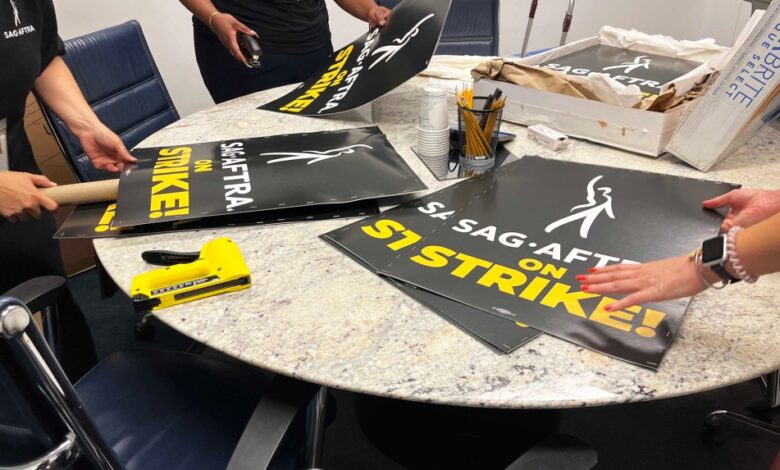Actors on Strike: How It Will Affect Movies and TV Shows

Remember when a new television season started in September? Not this year.
Looking forward to big-budget blockbusters coming to a theater near you next summer? Maybe not.
You’ve always heard great things about “Breaking Bad” or “The Wire” but never got around to watching it? Or maybe something more recent, like “The Last of Us,” which has just been nominated for over two dozen Emmy awards? This is your chance.
And besides, it might take you a while to figure out how many of those Emmys “The Last of Us” end up taking home. The awards ceremony, as with much in the TV and film industry, is also very uncertain at the moment.
But what you can count on is more reality shows, and maybe game shows, and probably more opportunity to binge shows that have already been on your streaming service of choice.
That’s because about 160,000 SAG-AFTRA actors are on the verge of strike, along with more than 11,000 Writers Guild of America members who have been on strike since May 2.
LONG DISTANCE PREPARATION
Of course, some films are already complete, such as ‘Barbie’ and ‘Oppenheimer’, and will soon be released in the cinema. And just like automakers or other manufacturers that might try to build additional inventory ahead of strike deadlines, some streaming services have been preparing for these strikes by stockpiling new movies and shows to roll out.
“We had to plan for the worst. And so we have a pretty robust lineup of releases that will last us a long time,” Netflix co-CEO Ted Sarandos said in April, just before the writers’ strike began.
But that pipeline of new shows is already slowing down to a trickle.
California movie licensing data indicates that production of most shows and movies has already been halted by the writers’ strike. While movies usually have a script in hand when they start shooting, revisions and changes usually mean a writer is needed as production progresses.
With actors also going on strike, most of the remaining production will stop. The exception is independent films that are not associated with any of the major studios.
One group of television shows that will continue to produce new episodes are the traditional daytime soap operas. The writers on those shows are typically non-unionized, and the unionized actors work under a different contract than the one that expired Wednesday at 11:59 p.m. PDT.
But most other actors will stop working once the union’s governing council votes to go on strike later Thursday. Ordinary members have already voted 98 percent to allow a strike.
Actors will not publicize films that are released, including appearing on the red carpet at movie premieres or doing interviews on podcasts. Of course, the writers’ strike caused new episodes of American late night shows to be halted immediately, so the ability to make that kind of publicity was already limited.
HOW LONG WILL IT STAY THAT?
What is not clear is how long this will take. Some in the industry are hoping that since writers and actors are out at the same time, the studios and streaming services will come under pressure to improve their offerings and get everyone back to work as quickly as possible. The last time the writers and the Screen Actors Guild, the predecessor of SAG-AFTRA, went on strike at the same time was in 1960 – so long ago Ronald Reagan was the SAG president who led that strike.
But everyone agrees that the industry is going through an unprecedented change as the way audiences consume shows is rapidly changing, and the economy is changing with it.
Disney CEO Bob Iger appeared Thursday morning not to suggest that a solution will be forthcoming any time soon.
“They add to a series of challenges that this company is already facing that are frankly very disruptive,” Iger, who will receive more than $25 million in compensation this year, said of SAG-AFTRA and Writers Guild in an interview on CNBC. “You have to be realistic about the business environment and what this company has to offer.”
But the unions say their members are suffering from the changes in the business, such as the shrinking amount of broadcast residue in the age of streaming, and they’ve been pushed to the point where they can’t accept what the studios and streaming services are doing. to offer.
“The studios and streamers have made massive unilateral changes to our industry’s business model, while at the same time insisting on keeping our contracts frozen in amber,” Duncan Crabtree-Ireland, the union’s chief negotiator, said early Thursday morning. “The studios and streamers have underestimated the determination of our members, as they are about to discover in full.”
So don’t expect many of your favorite shows to return anytime soon.



